I am pleased to announce the publication of my book, DeepLight: A Memoir of the Soul.

DeepLight: A Memoir of the Soul is a rich narrative of a contemporary woman’s spiritual quest. Within the context of her extensive study of religious and mystical traditions, and her experiences as a woman, a monastic, and an Episcopal priest, Susan Creighton weaves a spiral tapestry of memories, journal entries, and poetry. Her search for an authentic practice of contemplative prayer led across cultural, historical, and religious boundaries, but is most significantly shaped and enriched by the teachings of mystics like St. John of the Cross and the ancient tradition of Orthodox ascetical theology and spiritual practice. Now living under vows as an anchorite, her memoir shares with the reader ways in which the Jesus Prayer and other spiritual practices lead to deeper contemplative prayer as well as helping us develop greater discrimination and compassion for ourselves and others.
Endorsements:
“Creighton’s fascinating memoir, which reminds me of Thomas Merton’s Seven-Storey Mountain, explores how a brain disorder can affect, even intensify, spirituality.”
–Eve LaPlante, author of Seized
“If anyone can speak truly about a personal pilgrimage into an ‘anchorhold’ of profound faith, it is Susan Creighton. . . . Her story will speak to any seeking soul as it has to mine.”
–Luci Shaw Author of Thumbprints in the Clay
“To write about the soul, you have to know it, yours, and in some deeper ways, the souls of others. When I visited Susan’s anchorhold, and sat with her there, I knew I was with someone who did.”
–Gregory H. Rickel, VIII Bishop of Olympia (Washington)
“This is not a book to be read hastily. It should be savored, wrestled with, confronted as the reader walks with [Creighton] the spiral labyrinth to the heart of all being.”
–Linda Maloney, OblSB
“DeepLight is an uncommon invitation to observe a long, rich, and difficult Christian spiritual life. Seldom is such a life uncovered with such brutal honesty, courage, and love.”
–Kathryn Rickert, School of Theology and Ministry, Seattle University
“DeepLight testifies about a lifelong intensive search for the “essence” of faith in deep prayer and union with God . . . Reading the book . . . may open up a deep inner response, allowing the gentle voice of one’s own soul to be heard in the midst of a hurrying, noisy and violent world.”
–Ingrid Schirmer, University of Hamburg
DeepLight: A Memoir of the Soul may be ordered from Wipf and Stock Publishers http://wipfandstock.com
Resource Publications
ISBN 13: 978-1-5326-4540-2
Retail: $25.00 Web price: $20.00
Pub. Date: 4/11/2018
Available on Amazon, Ingram, and Kindle by mid-May.
Susan Creighton is an anchorite in the Episcopal Diocese of Olympia. Ordained a priest in 1981, she has served in monastic, parish, and campus settings. She now fulfills her vocation under vows of silence, solitude, and simplicity, focusing her prayer and study around the ascetical and mystical teachings of the Prayer of the Heart. Her blog may be found at www.holydwelling.com, and she lives in Bellingham, Washington. Her email is anchorite@holydwelling.com
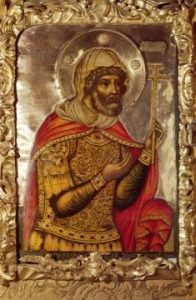 Now when the centurion and those with him, who were keeping watch over Jesus, saw the earthquake and what took place, they were terrified and said, ‘Truly this man was God’s Son!’ (Matthew 27:54)
Now when the centurion and those with him, who were keeping watch over Jesus, saw the earthquake and what took place, they were terrified and said, ‘Truly this man was God’s Son!’ (Matthew 27:54)
The Centurion
The others said He was dead,
To be sure, I drove my spear into His side.
His Blood splashed down upon me
And I felt a chill to my spine.
The sun is setting; the women have gone.
Some old man has come to claim His naked Body.
We have divided his garments among us.
I won His tunic with a throw of the dice.
I will keep watch where they have laid Him.
It is the least I can do.
Perhaps this Robe of His will warm my flesh.
Indeed, my heart seems strangely warm.
Good Friday 2018 (c) Susan Creighton
Tradition holds that Longinus was the Roman centurion who was in charge of the men guarding the Cross with Christ crucified on it at Golgotha. Later, he was baptized and began preaching the Gospel himself. He died a martyr’s death for his beliefs, and was later canonized.
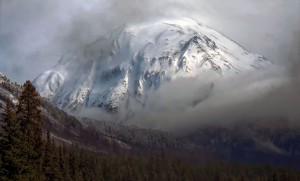
SILENCE of the WORD
How does one make a gift of words
to the ONE who is the WORD?
How can silence be heard in a cacophony of words
when only in SILENCE can the WORD be heard?
How can a noisy world receive a breath of silence
When the ONE who made the world is SILENCE?
Blessed Mary said “Yes” to the WORD
carrying the SILENCE of ONE in her womb.
The hermits of old said “Yes” to the WORD
listening to the ONE of SILENCE in solitude.
The poets of today say “Yes” to the WORD
bringing the SILENCE of ONE to our hearts.
Susan Creighton © 2018

The Wailing of the Wood
Good Friday, 2017
Many sunrises ago, my mother seed,
plucked by a hungry dove,
and nourished in its belly,
fell upon rocky soil, was trod
deep by a wandering sheep’s hoof,
then thirstily drank the droplets
from a summer’s rain.
Seasons passed, and many more;
my cells swelled and grew,
ever stretching toward the Light.
Then one late autumn day, sharp steel
axes cut deep into my flesh, and I fell hard
upon the rocks that had been my cradle.
In the dim months of winter, I was carried,
pulled, tugged, and flipped, with steel teeth
cutting deep into my flesh again,
until shaped square and planed smooth.
The spring-time moon shone brightly overhead,
when once again I was hauled about,
cut into two pieces, and sent upon my way.
My longest part reached the Hill first;
then came my shorter portion,
carried upon a poor Man’s bleeding shoulders;
He could barely walk beneath my weight.
My parts were joined, and then His flesh was
laid upon my own, and hammered in.
They lifted us together, and as His sinews were torn
and joints were pulled, my own flesh stretched
to hold him close, secure. A last breath sighed,
“Forgive them all,” and I knew my work was done.
His Mother wept; his friends fled, as all around
the mountains echoed the eternal cry:
“Remember that you are dust, and to dust you shall return.”
© 2017 Susan Creighton

Palm Sunday, 2017
The Donkey speaks:
What’s that you say?
The Lord has need of me? And my foal as well?
To carry Him to Jerusalem this day?
Ah, well, that is my lot in life, is it not?
To carry burdens upon my shoulders, like the Cross I bear.
Oh, my—I wonder if He will notice the Cross upon my back?
Will he see the Cross again very soon?
In five short days, they say.
And then I will not be there to carry Him.
For He will bear His own Cross,
And be a beast of burden for all the world.
He may ride upon my back this day.
Susan Creighton, April 9, 2017
The “Christmas Sermon”
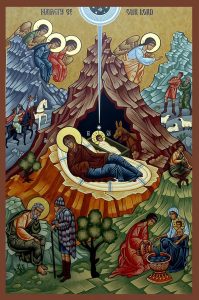 of St. Isaac the Syrian
of St. Isaac the Syrian
This night bestowed peace
on the whole world;
so, let no one threaten;
this is the night of the Most Gentle One;
let no one be cruel;
this is the night of the Most Humble One;
let no one be proud.
Now is the day of joy;
let us not revenge;
now is the day of good will;
let us not be mean-spirited.
In this day of peace
let us not be conquered by anger.
Today the Bountiful impoverished
Himself for our sake;
so, rich one, invite the poor to your table.
Today we received a gift
for which we did not ask;
so let us give alms to those
who implore us and beg.
This present day cast open
the heavenly door to our prayers;
let us open our door to those
who ask our forgiveness.
Now the Divine Being took upon Himself
the seal of humanity,
in order for humanity to be
adorned by the seal of Divinity.
CHRISTMAS BLESSINGS 2016
“This is the night of the Most Gentle and Humble One:
Let no one threaten; let no one be cruel;
let no one be proud.”
Thus spoke St. Isaac of Syria in the seventh century.
It is a very long time since then. When once camels, horses, and donkeys carried us along our way, now we line up to board jumbo jets, driverless cars, and satellites in space. When once long ago merchants scratched their accounts on stone or parchment, and saints did the same with their words of wisdom, now our keyboards clatter out the bits and bytes, and send our thoughts and even our finances winging through the ether.
Yes, it is a very long time since the seventh century. Potentates, tyrants, and presidents have risen and fallen. That has not changed. Nor has the slaughter of innocents, nor the fear of the stranger, nor the martyrdom of the faithful.
In our own era of worldly chaos, let us remember that fourteen hundred years ago the words of Isaac the Syrian (7th C. AD) proclaimed the eternal hope and truth of the birth of the Most Gentle and Humble One, Jesus of Nazareth.
“Invite the poor to your table;
give alms to those who beg;
open the door to those who ask forgiveness.”
And fourteen hundred years before Isaac, the words of Isaiah the Prophet (7th C. BC) proclaimed the birth of The Prince of Peace.
For unto us a child is born, unto us a son is given:
and the government shall be upon his shoulder:
and his name shall be called
Wonderful, Counselor,
The mighty God,
The everlasting Father,
The Prince of Peace.
Isaiah 9:6
May the words of both Isaac of Syria and Isaiah the Prophet be heard and heeded throughout the earth in our own day. And let us remember that the Lamb of God is the only source of true peace, hope, and justice.
As I celebrate the Holy Eucharist on this Easter Evening, my heart is full of joy of our Lord’s Resurrection and also sorrow for the martyrdom of a righteous Muslim, Asad Shah of Glasgow, Scotland, only hours after he wrote:
“Good Friday and a very Happy Easter, especially to my beloved Christian nation. Let’s follow the real footstep of beloved holy Jesus Christ and get the real success in both worlds.”
May his witness be a shining light to all peoples of all faiths.
May God have mercy on the soul of Asad Shah, a Glasgow immigrant shopkeeper killed on Thursday. From the Telegraph:
A popular shopkeeper was stabbed to death by another Muslim in a “religiously prejudiced” attack hours after posting an Easter message on Facebook to “my beloved Christian nation”.
Asad Shah, 40, a devout Muslim originally from the Pakistani city of Rabwah, had his head stamped on during a savage attack, according to one eyewitness.
Around four hours earlier the victim wrote online: “Good Friday and a very Happy Easter, especially to my beloved Christian nation.“Let’s follow the real footstep of beloved holy Jesus Christ and get the real success in both worlds.”
On Friday afternoon, police confirmed that a 32-year-old Muslim man had been arrested in connection with Mr Shah’s death.
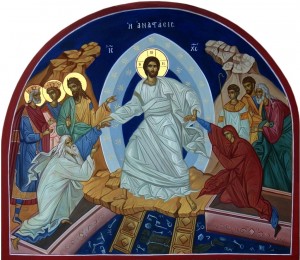
“He descended to the dead . . .”
In the midst of life we are in death;
from whom can we seek help?
From you alone, O Lord,
who by our sins are justly angered.
Holy God, Holy and Mighty,
Holy and merciful Savior,
deliver us not into the bitterness of eternal death.
Lord, you know the secrets of our hearts;
shut not your ears to our prayers,
but spare us, O Lord.
Holy God, Holy and Mighty,
Holy and merciful Savior,
deliver us not into the bitterness of eternal death.
O worthy and eternal Judge,
do not let the pains of death
turn us away from you at our last hour.
Holy God, Holy and Mighty,
Holy and merciful Savior,
deliver us not into the bitterness of eternal death.
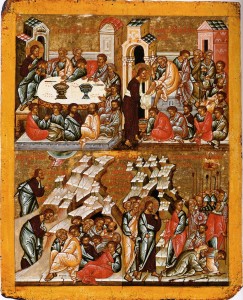
Holy Thursday, 15th c. Russian
SIMPLE THINGS
Maundy Thursday
There is something about the Maundy Thursday liturgy that always connects with my deepest feelings . . . In fact, I think it is probably my most favorite liturgy of the entire Church Year! Maundy Thursday is so very different in tone and mood. It is something quite “other” than the deep solemnity of Good Friday, or the dark brilliance of Midnight Mass at Christmas, or even the glorious joy of the Easter Vigil.aPerhaps what I most like about it is that it is so very ordinary, so very simple.
When I was a sister of the Order of St. Helena, the Convent celebrated Holy Week according to the ancient traditions of the Church, following the Monastic schedule: We all kept complete silence for the entire week (except for the Offices—Morning and Evening Prayer, Noonday Prayer and Compline). Even guests who came to spend the week with us entered into the silence, which seemed to deepen as the week went along and we read all the scriptures telling of Jesus’ last week: His grand entrance into the City on Palm Sunday, his teaching in the Temple, and his driving out the money-changers. . . . It was all like being a participant in a grand drama.
Yet when we came to the afternoon of Maundy Thursday, the mood shifted: our silence was ended as we bustled around in the kitchen, preparing an Agape Feast of roast lamb and all the trimmings. Even the chapel and sacristy became places of heightened activity: polishing the best silver chalice and preparing for the vigil through the night.
But even in the bustling around, there was an awareness that what we were doing was so ordinary, so simple
Ordinary, simple activities that all of us, as single people and families, have been doing this night also: We’ve had our evening meal, perhaps leisurely, perhaps rushed, yet all of us doing what we do every night of our lives . . . Gathering around our kitchen tables at the close of the day, perhaps with family, or friends; gathering to eat our meals, to talk, to be with one another.
Now, in the liturgy, we are about to do another simple thing: to give rest to the weary by reaching out and touching each other—by bending some tired, aching backs to lean over and touch gently some tired, aching and dirty feet. Simply to do for another what we might wish to have done for our own weariness.
Then we will gather again around this second table to share in another very simple meal: a morsel of bread, a sip of wine.
And then the night will close down, and we will each go off our separate ways—some to sleep, some to work, some to watch and pray.
Simple things: eating, touching, praying.
Simple things which have been done down through the ages from the time the world began—in different ways, in different times, even to different Gods—but still such simple things.
Pre-historic cave dwellers sharing a successful hunt around a fire—eating quickly, speaking but rarely, drawing close to one another as the night draws in with its unknown terrors.
A wandering Aramean herdsman—Abraham—offering curds and milk and a young calf to three strangers by the oaks of Mamre, and receiving their commiserations about a barren wife named Sarah.
City dwellers, aliens in a foreign land, preparing to flee their oppressors, eating in haste of roasted lamb, and bitter herbs, and unleavened bread.
Within my own memory, the family gathering at the end of a long day, eating our dinner, sharing the news of the day, simply being in the presence of one another in quiet communion and joy. And then we’d adjourn to the living room to sit by the fire, read the paper, do homework. And so often, Daddy would ask my sister or me to rub his feet, tired from standing in long hours of surgery or from walking miles of irrigation ditches on the farm.
Simple, ordinary things of eating…touching…loving.
And yet so very profound.
These very simple things are so full of meaning and power and love that they have undergirded the whole of Western civilization as we know it. Ordinary actions meeting ordinary human needs, becoming the most powerful sacraments of God’s love.
Simple things we do, but O! such a wealth of riches held for us in their very simplicity.
We think of Maundy Thursday as the beginning of the Triduum—the “Three Days” of Maundy Thursday, Good Friday, and Holy Saturday: In the monastic tradition there is an intensification of silence, a paring down of the Office to its bare bones of psalms and collect; and then the heady joy of a talking dinner, a joy is muffled by the knowledge of the hours that lie before us . . . the hours when each of us would “watch one hour” before the reserved Sacrament, in memory of the dark hours Jesus spent in the Garden of Gethsemane, the hours during which his disciples fell asleep.
Maundy Thursday is also the time in which we celebrate the centrality of the Eucharist—of its institution on this night—of the words of Jesus: “This is my Body. This is my Blood.”
We move from dinner that feeds our bodies to the Eucharist that nourishes our souls. We move from the light-hearted banter of late afternoon to the solemn joy of touching one another, hands to feet.
We move from the communal sharing of the dinner table to the communion of the altar—and then we move from that union with one another to the solitude of our own homes, some of us perhaps spending an hour in prayer this night, as we too, remember Jesus in the Garden as he prayed, “Father, let this cup be taken from me . . .
Through all these activities—family meals and the washing of feet, and the sharing of Holy Communion, there runs a single thread, a single meaning: That is the command of this night: To love one another.
Just as the most simple actions become such profoundly grace-filled sacraments, so too does that single thread of love lead us to many levels, in many directions.
It leads us to the immense love brought to us through the faithfulness of the church over the ages; to the love that reaches out to embrace the penitent and the sorrowful; to the love that restores both the individual and the community.
There is a wonderful moment in the old Roman rite of reconciliation on Maundy Thursday, in which the penitents (barefooted and carrying unlit candles) are presented by the archdeacon to the Bishop at the door of the church. The archdeacon says,
“The acceptable time is at hand, the day of God’s mercy and man’s salvation, when death is destroyed and eternal life begins—For, although there is no moment when God’s goodness and love are absent, now in his mercy his forgiveness of sins is more abundant . . . Now our community is increased by the reborn, our numbers augmented by those returning. The waters cleanse and so do tears; therefore we rejoice at those who are first called, and our joy is great when sinners are forgiven.”
“Waters cleanse, and so do tears.” . . . This is the sign of that great love which calls us here tonight. If we are to be fully human, fully who we are called to be by God, we often need to weep with one another, to forgive one another, to be cleansed and healed together.
We also need to nourish one another. How well do we truly know and care for one another? We may live, work, eat, and pray together but so often we may walk in loneliness in the midst of community. This, too, is where we are led by that great thread of love: to the love that truly nourishes the other—”This is my Body, given for you.” To the love that draws us all into the one great bond of love in Christ Jesus. And above all we are drawn to the immense love of the Father that sustained Jesus in the loneliness of the Garden, and that sustains us in our loneliness.
It is not easy to discover this kind of loving nourishment. Perhaps it is particularly difficult to find in a one-sex, celibate community such as a monastery or convent; perhaps it is also difficult to find in ordinary families, in ordinary communities. Yet that great difficulty is also our greatest opportunity for truly finding and sharing the nourishment of love.
I don’t know exactly how it is done, but perhaps an experience I had years ago may help reveal it. One morning, while celebrating Eucharist at the convent, I looked at the wine in the chalice and saw something I had never before seen. In the center of the wine was a light, through which it seemed I was able to gaze into the whole heart of the universe. Then I realized that the light was formed by a perfectly symmetrical reflection from the four sanctuary lamps.
Because of the angles at which the light was reflected, it could only be seen when one stood in the place of the celebrant. I could not gather the sisters around the altar and show them this light all at the same time. It could only be seen by someone standing in one particular spot. It felt very lonely when I realized no one else could see what I saw—at least not in that moment. I could only tell others of the Light . . . the Love which I saw in the chalice at that moment.
Perhaps this is a metaphor for the loneliness which so many of us experience in our culture: the loneliness of parent and child; the loneliness of the elderly; the loneliness of the homeless; the loneliness of the ethnic or sexual minority. . . The love that we each see can only be seen by our own eyes; and yet we are drawn by that same love to carry it to each and every one of us. If we do not share the love that sustains our loneliness, if we do not nourish one another with that love, we too will die, we too will be abandoned and hungry.
Simple things we do this night:
Eating
Touching
Praying
Simple things which are so profound, and which are rooted in Love. Simple things which each of us sees from our own eyes, in particular and individual ways. Simple things which speak of the Love of God . . . but only if we speak, only if we eat together, touch one another, pray together.
Jesus says to his disciples on this night, as he washes their feet: “Do you know what I have done to you? You call me Teacher and Lord; and you are right, for so I am. If I then, your Lord and Teacher, have washed your feet, you also ought to wash one another’s feet. For I have given you an example, that you also should do as I have done to you.”
Simple things.
Amen.
O Lord, in your great mercy,
Open the ears of your people,
that they may hear your Truth.
O Lord, in your great mercy,
Open the eyes of your people,
that they may see your Justice.
O Lord, in your great mercy,
Open the hearts of your people,
that they may serve your Love.
In the Name of the Father,
and the Son, and the Holy Spirit. Amen.